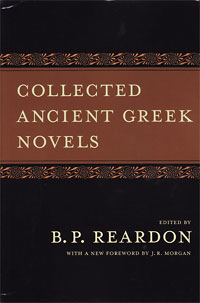“Athletes and people who take an interest in the care of the body do not confine their attentions to physical exercise and attaining a good condition,” begins a novel that recently arrived on my desk:
They take thought also for relaxation at appropriate intervals; indeed, they consider it the most important element in training. Similarly, in my opinion, literary people should after extended reading of serious authors relax mentally, to refresh themselves against subsequent exertions. They will find this interlude agreeable if they choose as company such works as not only afford wit, charm, and distraction pure and simple, but also provoke some degree of cultured reflection.
The writing seems, at times, idiomatically odd (“They take thought also for relaxation”), if not outright clunky (“as company such works as not only”). And yet, in my reading at least, sense trumps style and my interest is held as A True Story, unfolds. “I trust,” its writer continues:
the present work will be found to inspire such reflection. My readers will be attracted not merely by the novelty of the subject, the appeal of the general design, and the conviction of verisimilitude with which I compound elaborate prevarications, but also by the humorous allusions in every part of my story to various poets, historians and philosophers of former times who have concocted long, fantastic yarns—writers I should mention by name did I not think their identities would be obvious to you as you read.”
 Matters of curious diction aside (“I compound elaborate prevarications”), the writer is beginning his story not with that most famous species of beginning—the invocation of a muse—but that other, equally old incipit: the boast, in this case that a muse need not apply, our author having it very well under control, or so he claims.
Matters of curious diction aside (“I compound elaborate prevarications”), the writer is beginning his story not with that most famous species of beginning—the invocation of a muse—but that other, equally old incipit: the boast, in this case that a muse need not apply, our author having it very well under control, or so he claims.
My best sense is that our author is right, not that he would care, very dead as he is, along with his language, not to say his civilization. The author is Lucian (120-180), a Syrian from Samosata, a city on the Euphrates. We know little about Lucian, but are sure he was not a native Greek speaker, however well-versed he was in Greek literature. Thus he was able to produce, among other charming works, this novella-length piece of prose that plays, entertainingly, with storytelling form.
As its translator, the late B.P. Reardon, a noted scholar of the Greek novel, explains in his foreword to A True Story in his necessary omnibus, Collected Ancient Greek Novels (University of California Press), “The claim of this piece to inclusion in the present volume may be thought tenuous, but the novel, or romance—prose fiction—cannot be confined too fine, in antiquity or any other age.”
I must confess to loving that line, “cannot be confined too fine,” when we talk about the novel. We readers forget, sometimes, that Cervantes and Defoe and Flaubert were notable not for being pioneers of the novel but in it. Each narrowed, profitably, richly and, ultimately, briefly, our idea of what a novel could be. The novel cannot be confined too fine, save by novelists themselves, whose job it is to confine themselves to one idea of the novel—or, in the case of the most adventuresome practitioners, one idea of the novel at a time—in careers that try many species of confinement.
Though they share a single author, and may be accused of having indifferentiable styles, the narrowings we call Pnin, Pale Fire, Lolita, Ada, and Transparent Things are as different as novels can be. The novel is, after all, nothing if not a history of its incompatibilities, and it began, as with most of our rest, in Greek.
































































































